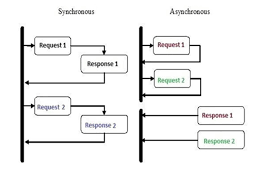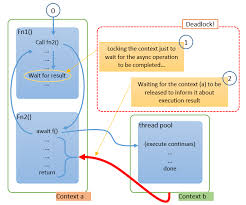Asynchronous Programming in C#
- .Net
- November 05, 2024
-
Asynchronous Programming in C#

Asynchronous programming in C# allows tasks to execute independently, without blocking the main thread of execution. This enables applications to remain responsive while performing long-running operations such as I/O-bound tasks or network requests.
Async and Await Keywords: Introduced in C# 5.0, the async and await keywords simplify asynchronous programming by enabling developers to write asynchronous code in a more synchronous style.

Tasks: Tasks represent asynchronous operations and provide a standardized way to work with asynchronous code. They can be awaited using the await keyword.
Asynchronous Methods: An asynchronous method returns a Task or Task<TResult> and typically includes asynchronous operations such as I/O-bound tasks, network requests, or CPU-bound operations offloaded to separate threads.
Concurrency vs. Parallelism: Asynchronous programming enables concurrency, allowing multiple tasks to execute concurrently without blocking each other. Parallelism, on the other hand, involves executing multiple tasks simultaneously using multiple threads.
Error Handling: Asynchronous code introduces challenges in error handling, especially when dealing with exceptions across asynchronous boundaries. Techniques such as try-catch blocks and Aggregate Exception help in handling errors gracefully.
Advantages:
Improved Responsiveness: Asynchronous programming keeps applications responsive by allowing them to perform non-blocking operations, ensuring a smooth user experience.
Scalability: Asynchronous code enables applications to handle a large number of concurrent requests efficiently, making it suitable for server-side applications such as web servers.
Resource Efficiency: By utilizing asynchronous I/O operations, applications can make better use of system resources and avoid unnecessary blocking, leading to improved performance.
Best Practices:
Use Asynchronous APIs: Utilize asynchronous APIs provided by frameworks like .NET to perform I/O-bound or long-running operations asynchronously.
Avoid Blocking Operations: Minimize blocking operations, such as synchronous I/O calls or CPU-bound tasks, within asynchronous methods to maintain responsiveness.
Error Handling: Implement robust error handling mechanisms to handle exceptions gracefully in asynchronous code, ensuring proper fault tolerance and reliability.
ssssssStart Your Data Journey Today With MSAInfotech
Take the first step towards data-led growth by partnering with MSA Infotech. Whether you seek tailored solutions or expert consultation, we are here to help you harness the power of data for your business. Contact us today and let’s embark on this transformative data adventure together. Get a free consultation today!

We utilize data to transform ourselves, our clients, and the world.

Partnership with leading data platforms and certified talents



